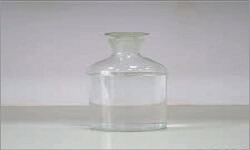IUPAC Name
2-[bis(2-hydroxyethyl)amino]ethanol
Cas Number
102-71-6
HS Code
2922.15.00
Formula
C6H15NO3
Industry
Paint, Ink and Coating
Appearance
Colorless Liquid
Common Names
TEA, Trolamine, Triethylolamine
Packaging
Packed in plastic barrels with 20kg per barrel
Brief Overview
Triethanolamine, also known as TEA, appears as a colorless viscous liquid. It is strongly alkaline and is mainly used as a pH regulator. It helps to form emulsions by reducing the surface tension of the substance to be emulsified. It is hygroscopic in nature and soluble in water and alcohols. It gives a slight ammoniacal odor due to the presence of an amine.
Manufacturing Processes
TEA is produced by the reaction of ethylene oxide with aqueous ammonia. Mono and diethanolamine are produced together and the product can be obtained by altering the stoichiometry of the reactants.
Cosmetics Industry
It is widely used a pH balancer in lotions, creams, eyeliners and other cosmetic products. The pH of the skin is around 5.5-6.0 and triethanolamine solution has a pH of 10. Because of its emulsion properties, it is used in cleansing solutions to remove makeup effectively.
Cement Industry
It is used as an organic additive in grinding cement clinker. It helps in grinding process by inhibiting agglomeration and coating of the powder at the surface of balls and mill wall.
Pharmaceutical Industry
It is used in various ear drops to treat ear infections. It acts as a neutralizing and emulsifying agent in the manufacture of many pharmaceuticals.
Other applications
It is extensively used in the manufacturing of synthetic resins as solvent in a casein, shellac, and dyes which increases the penetration of organic liquids into wood and paper, in the production of lubricants for the textile industry, and in making emulsions between mineral and vegetable oils, paraffin and waxes. It is also widely used as a complexing agent in electroless plating.
